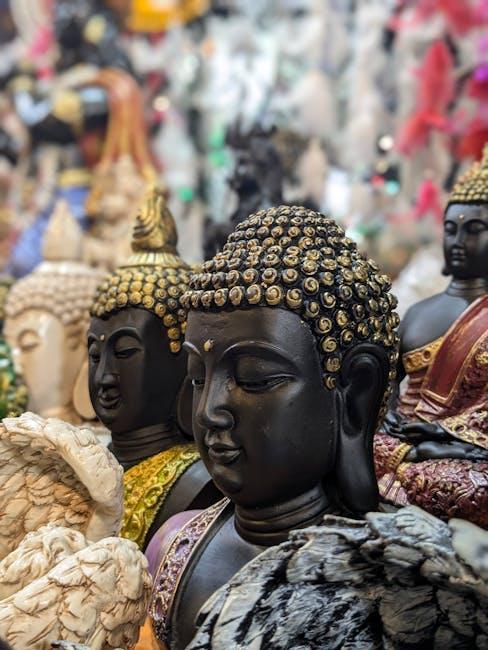In recent years, the age-old practice of meditation has quietly slipped from the serene confines of monasteries and ashrams into the bustling corridors of modern consumerism. Once a sacred ritual reserved for spiritual enlightenment, meditation now finds itself interwoven with the fabric of contemporary lifestyle brands and digital marketplaces. As meditation apps proliferate and wellness retreats become vacation staples, this ancient discipline is being repackaged and sold with the same zeal as the latest tech gadget or fashion trend. But as meditation transforms into a marketable commodity, questions arise: Has the essence of meditation been overshadowed by its commercial appeal? Or is this evolution a natural progression, making mindfulness accessible to the masses? In this exploration, we delve into the intersection of meditation and consumerism, seeking to unravel the complexities of this modern-day phenomenon.
Mindful Marketing the Commercialization of Inner Peace
In the age of digital enlightenment, where the quest for inner tranquility is often interrupted by the ping of a smartphone, meditation has found its way into the bustling world of consumerism. Once the domain of spiritual seekers and wellness enthusiasts, meditation is now a multi-billion dollar industry. But how did a practice rooted in simplicity and introspection become a commercial juggernaut? As the demand for peace of mind grows, businesses have seized the opportunity to market meditation apps, retreats, and even branded mindfulness products. The commercialization of meditation raises questions about the balance between genuine self-care and profit-driven motives.
- Mindfulness Apps: Companies are capitalizing on the digital age, offering subscriptions for guided meditations.
- Branded Retreats: Luxury meditation retreats promise tranquility but often come with a hefty price tag.
- Mindfulness Merchandise: From meditation cushions to scented candles, products are marketed to enhance the meditation experience.
While some argue that the accessibility of meditation through these platforms democratizes mental wellness, others caution against the dilution of its essence. The challenge lies in maintaining the integrity of meditation as a practice of self-discovery and not merely a tool for consumer indulgence. As businesses continue to innovate in this space, consumers are left to ponder whether they are purchasing peace of mind or merely the idea of it.

From Zen to Sale the Branding of Meditation Practices
In recent years, the serene world of meditation has been swept into the whirlwind of consumer culture. What once was a sacred practice reserved for monks and spiritual seekers is now packaged and marketed as a trendy lifestyle accessory. This transformation is evident in the plethora of meditation apps, designer meditation cushions, and luxury retreats promising enlightenment in picturesque locales. As meditation practices become increasingly commercialized, they risk losing their authenticity, becoming just another item on the shelf of self-improvement products.
- Meditation Apps: Promising peace in just a few clicks, these digital guides offer curated playlists, celebrity endorsements, and subscription models that echo the dynamics of consumerism.
- Designer Accessories: From eco-friendly mats to artisanal incense, the market is flooded with products that blend mindfulness with materialism.
- Luxury Retreats: High-end getaways that cater to affluent individuals seeking a break from the hustle, often with price tags that contradict the very principles of simplicity and non-attachment.
The commodification of meditation raises questions about the balance between accessibility and authenticity. While these branded offerings may introduce mindfulness to a broader audience, they also challenge the essence of a practice that traditionally values simplicity and introspection over external validation.

Balancing Profit and Peace Navigating the Meditation Marketplace
In today’s fast-paced world, meditation has emerged as a sanctuary for many, offering a retreat from the constant hustle and bustle. However, as its popularity has soared, so too has the commercialization surrounding it. The rise of the meditation marketplace brings forth a paradox where the quest for inner peace is entwined with the drive for profit. Is meditation still a spiritual practice, or has it become another cog in the consumerism machine?
Consider the following dynamics at play in this evolving landscape:
- App Overload: With countless meditation apps available, each promising to be the ultimate guide to tranquility, the choice can become overwhelming, turning the journey inward into a digital shopping spree.
- Luxury Retreats: High-end meditation retreats offer serene environments at a premium price, potentially alienating those seeking peace without the hefty cost.
- Mindfulness Merchandise: From branded yoga mats to mindful living accessories, the line between necessary tools and consumer excess can blur.
While the expansion of the meditation market democratizes access to mindfulness, it also challenges practitioners to discern between genuine offerings and those driven by profit. Navigating this space requires a delicate balance between embracing innovation and staying true to the essence of meditation.

Cultivating Authenticity How to Practice Mindfulness Amid Consumer Trends
In an era where mindfulness is often packaged and sold as the next big wellness trend, it can be challenging to maintain a genuine practice that stays true to its roots. Mindfulness is not merely a commodity but a profound journey into self-awareness and authenticity. Yet, the consumer landscape is saturated with products claiming to enhance this experience—from meditation apps to designer yoga mats. How do we navigate this commercial terrain without losing sight of mindfulness’s essence?
To cultivate authenticity amid these trends, consider the following practices:
- Set Intentions: Before engaging with any mindfulness tool or product, ask yourself why you are drawn to it. Is it truly to deepen your practice, or are you swayed by marketing allure?
- Prioritize Simplicity: Often, the most effective mindfulness practices require nothing more than your presence. Breathing exercises, body scans, or a simple meditation can be performed without any specialized equipment.
- Mindful Consumption: Approach purchases with awareness. Reflect on whether the product aligns with your values and enhances your journey authentically.
Future Outlook
As we stand at the crossroads of mindfulness and marketing, the journey of meditation through the lens of consumerism invites both introspection and dialogue. While its transformation into a marketable commodity raises questions about authenticity and accessibility, it also highlights an evolving landscape where ancient practices meet modern desires. Whether meditation’s commodification dilutes its essence or democratizes its benefits remains a conversation as fluid and complex as the practice itself. In this dance between inner peace and outer profit, perhaps the ultimate reflection lies not in the marketplace, but within ourselves—a reminder that the true value of meditation is not in its price tag, but in the stillness it offers amidst the noise.
